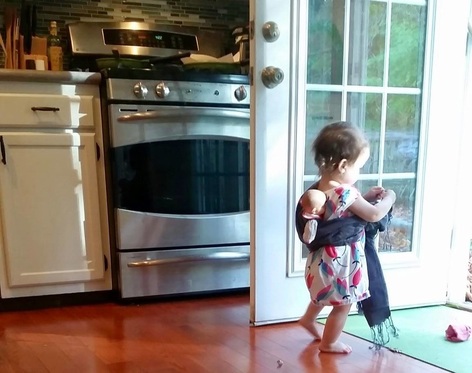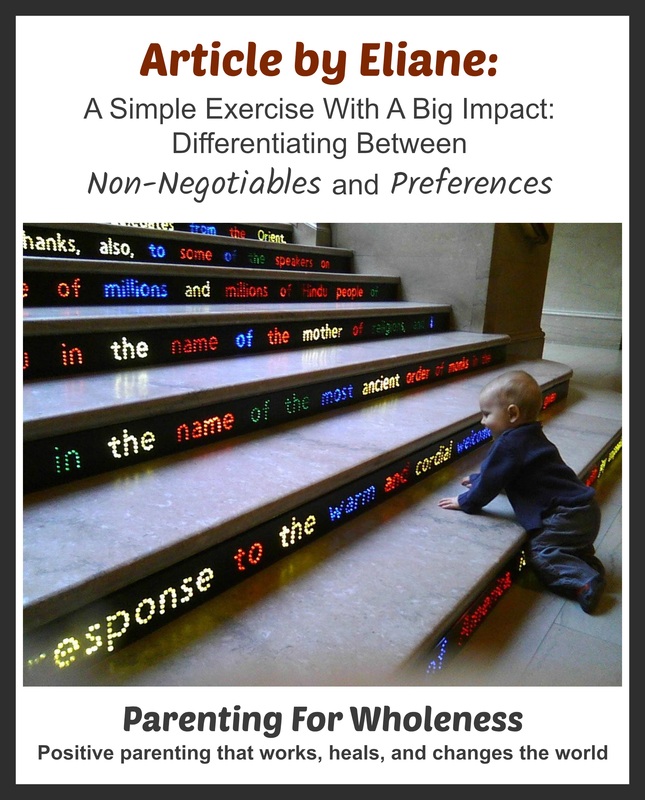A Simple Exercise With A Big Impact: Differentiating Between Non-Negotiables And Preferences11/15/2015
I’ve read loads of wonderful parenting articles since founding Parenting For Wholeness a few years ago, and have yet to come across one on this topic. Which surprises me because it’s one of the most powerful parenting concepts I teach, and it has a huge impact in the families of the participants in my Clean Parenting™ Program. I don’t know if I came up with it on my own (just because it makes so much damn sense!) or if I read it somewhere when I was finding my way with parenting. What I do know is it was key to my children being very responsive to my guidance, and even being what most people called (yuk!) obedient! So let’s start by taking a moment for you to get a sense of what many children experience. Take a moment to really feel into the following: Imagine working for a boss who is unclear and gives you inconsistent directions and guidance. How would that feel? How would you act in her presence? Now imagine a boss who is clear, gives you exactly the information you need and is consistent in what she expects of you. How does that feel? How would you act in her presence? Now, how do you think your child feels with you? Becoming clear in our communication with our children is key in enlisting their cooperation, having them take us seriously and listen to us. It’s also key in them being able to relax into their lives, knowing they have a clear leader/parent to rely on. And there’s one simple exercise you can do that will help you tremendously in being clearer in your parenting: Making a distinction between PREFERENCES and NON-NEGOTIABLES. The reason it’s important to get clear on this distinction is that those two situations should be handled differently. It’s also a huge help in becoming the clear benevolent leader our children need to be grounded, and to respect us and listen to us. So let’s dig in. I make a distinction between preferences, non-negotiables, and non-negotiables for you. PREFERENCES Preferences are things that you would really like your children to do (or not do), but:
NON-NEGOTIABLES Non-negotiables are things like hurting others or animals, running across the street, destroying property and saying particularly hurtful things. They are about safety and teaching our children what’s socially appropriate. They are things you will enforce 100% percent of the time and that you will model. NON-NEGOTIABLES FOR YOU There are things that are non-negotiables FOR YOU. Those are things that—although you know might be only a preference for other parents—are clearly a non-negotiable for you. This is about getting to know yourself and knowing what is really important to you—important enough that you’ll make it a priority to enforce and model it. These are things that need to happen in your family for you to feel good about it or for your needs to feel met. Examples of these could be:
Here’s a wonderful example of this, which my now friend Mona Sanei shared in the Clean Parenting™ Program Facebook group once that light bulb went on for her: THE LENTIL INCIDENT "For a long time, I chose to let throwing food intentionally be a preference for my 18 month old daughter, because I just couldn't handle having it be a non-negotiable. One day we were home, and I heated up a bowl of lentils. Knowing my daughter and how she loves to make messes, we went out on to the deck to eat so I didn't have to worry about clean up. At some point I turned around and there she was with over half the lentils having been thrown all over the kitchen floor. My gut reaction was to say, "why? why would you do that Livy??". It was so upsetting, but I stayed "strong" and proceeded to clean it all up and then GAVE her the bowl of the remaining lentils back. I turned around again to finish washing a dish and when I looked back at her, the rest of the lentils were on the floor and she was STEPPING on them!!! It zapped all the energy out of me to see that. I was so upset and not even mad at her. I let myself "go there". Really feel how upset I was, how defeated I felt, how helpless. And then I had an ah ha moment. And my energy came back, full force, because I had made a discovery: throwing food is a non-negotiable for ME! It was the truth all along and now I could finally honor that. So I got to her level, looked her in the eye, and told her that throwing food is now a non-negotiable. I told her we needed to go into the kitchen because there was a mess I needed her to help me clean up. Since that time, things have really shifted at home. The energy is better. She still does throw food sometimes, but the number of incidents has drastically dropped. The ability to be a leader was always in me and once I made my mind up to honor my non-negotiable, it was like second nature to lead her in that situation." What gets many parents in trouble is not differentiating between making requests of their children when they prefer they would do something, versus giving them clear guidance on what is expected and just not acceptable in our culture, society or family. Not making this distinction is confusing to children. Being clear on what is a preference for you versus what is a non-negotiable allows you to know exactly when to make a request (and accepting their ‘no’) versus when to give guidance (setting a limit or making sure to pursue a win-win solution.) If this is resonating with you, I bet I can guess what you’re now wanting to know: “How do I handle non-negotiables, and how do I handle preferences?’ This is something we work on extensively in my Clean Parenting™ Program. The truth is that there’s A LOT that goes into it. Because the most important factor is to set the right foundation in your family. This is what creates goodwill and cooperation between all the family members. (You can click here to request my FREE report which describes the four pillars of that foundation.) Once the healthy and connected foundation is established, it’s pretty easy to develop the simple skills to expertly handle each circumstance. But to not leave you hanging, here are some highlights to get you started, knowing there’s a lot more that goes into handling each. HANDLING PREFERENCES: If a situation is just a preference, ask your children to do what you want. If their answer is ‘no,’ you can either accept their ‘no,’ or get creative to inspire the behavior you want in a way that still honors them. You can look for win-wins so they feel good about accommodating your request. HANDLING NON-NEGOTIABLES: If a situation is a non-negotiable, set a firm limit, and plan on enforcing it 100% of the time. In many situations, once your children start getting that you mean business (there may be some adjustment period where things get worse before they get better,) it’s likely that just the clarity in your voice will lead to them listening, unless it clashes with something that's truly important to them. (Of course if you’re reading me, I’m assuming you know that I would NEVER suggest you impose anything on your children that isn’t respectful of who there are, and ignores their needs.) I plan on writing fully on both how to handle non-negotiables and how to handle preferences in the future. Make sure you’re on my email list if you want to be notified once those articles are published. You can get added to my list by requesting my report, which will give you a good foundation for this. Meanwhile, see the recommended articles below. Practically working on identifying non-negotiables and preferences, and learning how to handle each of them in an important part of the work we do in the Clean Parenting™ Program, my in-depth group coaching program which is designed to provide parents with the full peaceful parenting foundation. (I’m already starting to fill my group of 12 which starts January 6th, and the early bird rate still applies for a short time. Email me so we can set up a time to meet on Skype, if you’re interested in participating.) And now an exercise for you: Take 3 things you regularly struggle with in your family. Then make a conscious decision on whether what you want in each situation is a non-negotiable or a preference. Can you see how having that clarity could help you in those situations? It can take time and some experimenting to get clear on what your non-negotiables are versus your preferences, especially if you tend not to value your own needs or be disconnected from your truth. If that's the case, going through the process of getting clear on this will not only help your relationship with your children, but it will also be a wonderful process of getting to know and value yourself. Which if you ever work with me, you'll realize is what I'm most passionate about and my intention for you. :-) Lots of love to you and your family, WANNA GIVE BACK? Did you get value from this article? If so I would be incredibly grateful if you could share this article with your friends on Facebook (below) or Pinterest. I would LOVE help
3 Comments
Eliane Sainte-Marie
11/16/2015 07:26:31 am
Becoming clear in our communication with our children is key in enlisting their cooperation, having them take us seriously and listen to us.
Reply
Odile
11/16/2015 09:51:30 am
Great idea making the distinction in your mind. How do you convey the difference to your child?
Reply
Leave a Reply. |
PARENTING FOR WHOLENESS
HOME BLOG PROGRAMS CLEAN PARENTING™ PROGRAM QUICK START PROGRAM CONTINUUM CONCEPT WHAT IS CLEAN PARENTING™? © 2021 PARENTING FOR WHOLENESS |
|





